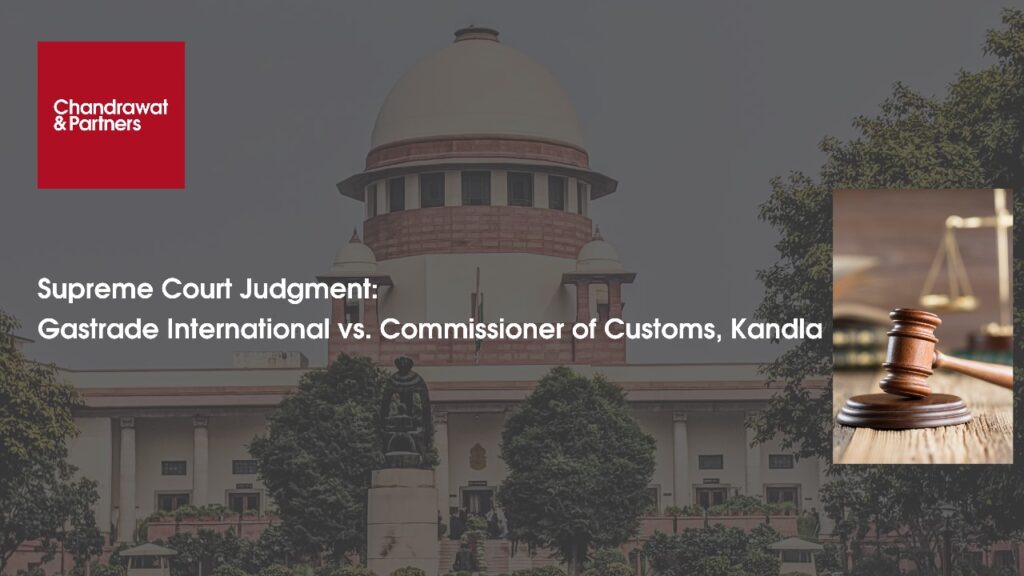Home > Recent Judgements > Supreme Court Judgment: Gastrade International vs. Commissioner of Customs, Kandla
April 01, 2025
Supreme Court Judgment: Gastrade International vs. Commissioner of Customs, Kandla
The Supreme Court of India delivered a pivotal judgment in the case of Gastrade International vs. Commissioner of Customs, Kandla. These ruling addresses critical issues concerning customs duties and import regulations, particularly the classification of imported goods under the Customs Act, 1962. The Court’s interpretation provides significant guidance on how importers and customs authorities should handle valuation disputes, especially when comprehensive testing facilities are lacking.
Case Background
Gastrade International imported goods declared as “Base Oil” from the United Arab Emirates. However, the Directorate of Revenue Intelligence (DRI) intercepted the cargo, suspecting that the goods were, in fact, High-Speed Diesel (HSD), a restricted item for private importers. Multiple laboratory tests were conducted, some indicating partial conformity to HSD specifications under IS 1460:2005. This led to a legal dispute over the correct classification of the imported goods.
Legal Proceedings
- Adjudicating Authority’s Decision: The Commissioner of Customs concluded that the imported goods were HSD, leading to their confiscation and the imposition of penalties on Gastrade International.
- CESTAT’s Ruling: The Customs, Excise, and Service Tax Appellate Tribunal (CESTAT) overturned the Commissioner’s decision, asserting that the goods could not be classified as HSD due to incomplete testing across all specified parameters.
- High Court’s Judgment: The Gujarat High Court reinstated the Adjudicating Authority’s decision, applying the “preponderance of probability” standard to classify the goods as HSD.
Supreme Court’s Analysis and Judgment
The Supreme Court scrutinized the methodologies employed in classifying the imported goods and addressed the adequacy of expert opinions under Section 45 of the Indian Evidence Act, 1872. The Court observed that expert opinions, while valuable, are not binding and must be critically evaluated, especially when they exhibit shortcomings or ambiguities. The Court emphasized that incomplete testing, covering only a subset of the 21 parameters specified in IS 1460:2005, could not conclusively determine the goods as HSD.
In the absence of comprehensive testing facilities, the Court advocated for the application of the “most akin” test as outlined in Rule 4 of the General Rules for Interpretation of the Customs Tariff. This approach involves classifying goods under the heading to which they bear the closest resemblance when they do not precisely match any specific category. Applying this principle, the Court determined that the evidence was inconclusive to classify the goods as HSD and extended the benefit of the doubt to Gastrade International.
Implications of the Judgment
This landmark ruling underscores the necessity for comprehensive and conclusive testing in the classification of imported goods. It highlights the limitations of relying solely on partial test results and expert opinions that lack definitive conclusions. The judgment also reinforces the importance of adhering to the “most akin” test in situations where complete conformity to a specific classification is indeterminate.
Furthermore, the Supreme Court directed customs authorities to enhance testing facilities to ensure all relevant parameters can be thoroughly evaluated in future classification disputes. This directive aims to mitigate uncertainties and promote accuracy in the assessment of imported goods.
Conclusion
The Supreme Court’s decision in Gastrade International vs. Commissioner of Customs, Kandla provides critical guidance on the classification of imported goods under the Customs Act, 1962. By emphasizing the need for comprehensive testing and the prudent application of the “most akin” test, the judgment seeks to balance the interests of importers and regulatory authorities, ensuring fair and accurate classification in the realm of international trade.
For more information or queries, please email us at
[email protected]





